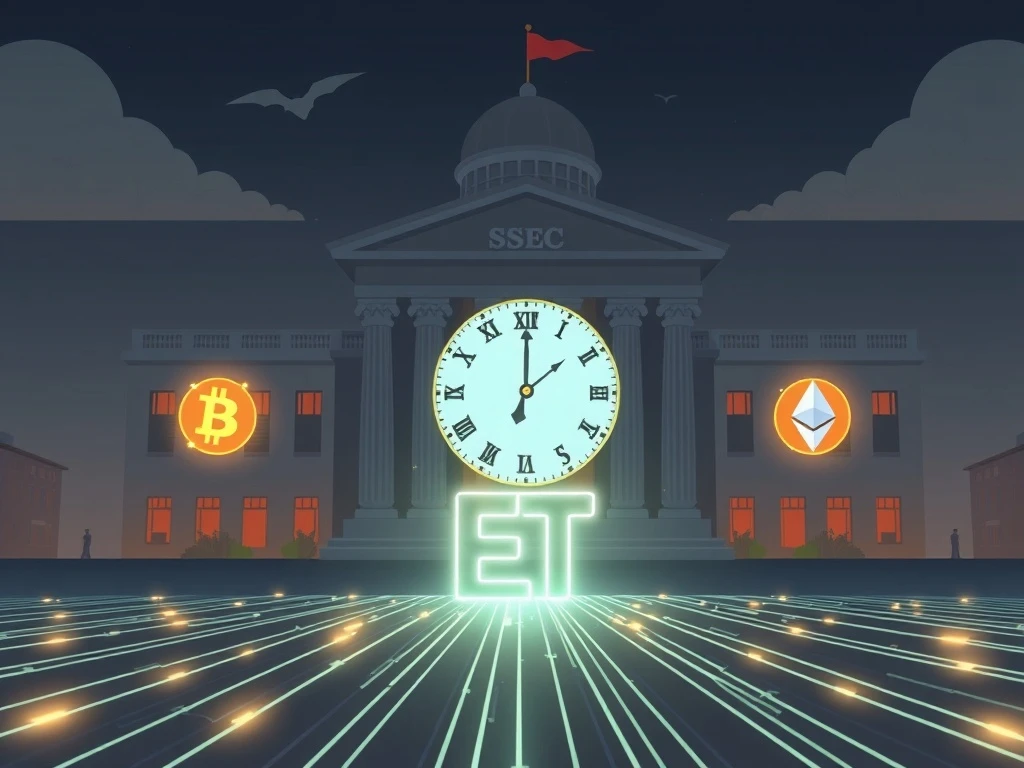SEC Delays Crucial Bitwise Crypto ETFs: A Lingering Uncertainty

The world of cryptocurrency investment is no stranger to regulatory hurdles, and the latest news from the United States Securities and Exchange Commission (SEC) adds another layer of complexity. Investors keenly watching the development of spot crypto ETFs are now facing another delay, specifically regarding Bitwise’s proposed Bitcoin and Ether exchange-traded funds.
Understanding SEC’s Latest Move on Crypto ETFs
The SEC has once again pushed back its decision deadline. This time, the focus is on whether to permit “in-kind redemptions” for Bitwise’s spot Bitcoin (BTC) and Ether (ETH) ETFs on NYSE Arca. What exactly are in-kind redemptions? Unlike traditional cash redemptions where an ETF is liquidated for its cash equivalent, in-kind redemptions allow investors to exchange their ETF shares directly for the underlying assets – in this case, Bitcoin or Ether. This mechanism is common in other asset classes and can offer distinct advantages.
The extension, while not uncommon for the SEC, highlights the regulator’s cautious approach to digital assets. The official statement noted that a “longer period” is needed to “consider the proposed rule change, and the issues raised therein.” This deliberate pace underscores the complexity the SEC perceives in integrating novel crypto ETFs into established financial frameworks.
The Significance of In-Kind Redemptions for Bitcoin ETF Investors
For those holding a Bitcoin ETF, the ability to redeem in-kind could be a game-changer. Primarily, it impacts tax implications. When an investor redeems an ETF for cash, it typically triggers a taxable event based on capital gains. However, with in-kind redemptions, the direct exchange of ETF shares for the underlying cryptocurrency might be treated differently, potentially deferring or altering tax liabilities. This feature offers flexibility, allowing large institutional investors or authorized participants to manage their positions more efficiently.
It aligns with the fundamental structure of many traditional ETFs, providing a more direct link to the underlying asset rather than just its cash value. This could enhance the appeal of a Bitcoin ETF to a broader range of investors seeking direct crypto exposure without the complexities of direct ownership or custodial solutions. The ability to directly access the underlying Bitcoin could also improve market efficiency and liquidity for the ETF.
What This Means for the Future of Ether ETF Approvals
The SEC’s decision on Bitwise’s Ether ETF mirrors the scrutiny applied to its Bitcoin counterpart. The fate of in-kind redemptions for one often sets a precedent or indicates the regulatory mood for the other. As the industry awaits the final verdict on spot Ether ETFs, this delay adds to the uncertainty. A favorable ruling on in-kind redemptions for both BTC and ETH ETFs could signal a more mature and integrated approach by the SEC towards digital asset products. Conversely, continued delays or outright rejections could maintain a fragmented regulatory landscape, impacting market liquidity and investor confidence in these emerging products.
The interconnectedness of Bitcoin and Ether in the crypto market means that decisions affecting one often ripple through to the other. An approved Ether ETF, especially with in-kind redemption capabilities, would open up significant new avenues for institutional and retail investment, further legitimizing Ethereum as a core asset in the digital economy.
Is the SEC Accused of Foot-Dragging on Crypto Approvals?
This latest extension is not an isolated incident. The SEC has faced accusations of “foot-dragging” from various corners of the crypto industry. A notable example is digital asset manager Grayscale, whose attorneys recently challenged the SEC’s delay in approving its Digital Large Cap ETF. Grayscale argued that the regulator’s review and halt of a previously approved product violated statutory deadlines and established procedures. Such delays have led to frustration within the crypto community, with critics suggesting that the SEC’s cautious approach stifles innovation and creates an uneven playing field compared to traditional finance.
The pattern of extensions has become a hallmark of the SEC’s engagement with novel crypto products, often pushing decisions to the very last possible moment allowed by law. This approach, while perhaps intended to ensure thorough review, often leaves market participants in a state of prolonged anticipation and uncertainty, impacting investment strategies and market development.
Navigating the Evolving Landscape of Crypto ETFs and Regulation
Despite the ongoing conflicts and delays, there’s a perceived shift in the SEC’s overall stance towards crypto. Since the Trump administration took power and Paul Atkins assumed the role of SEC Chair, replacing Gary Gensler, a more encouraging tone has emerged. Atkins recently stated that the regulator now views tokenization as an “innovation” to be fostered in the marketplace.
Atkins has openly contrasted his approach with his predecessor’s, acknowledging that previous policies, characterized by “vague laws” and “regulation through enforcement,” had hindered innovation. His declared goal is regulatory transparency and building a foundation that supports new products and technological advancement. This evolving perspective, if consistently applied, could pave the way for a clearer, more predictable regulatory environment for crypto ETFs and other digital asset products.
For investors, this means staying informed about regulatory nuances. While delays can be frustrating, they are part of the process of integrating new asset classes into established financial frameworks. The long-term trajectory appears to be towards greater clarity, even if the path is winding.
The SEC’s decision to delay its ruling on in-kind redemptions for Bitwise’s Bitcoin and Ether ETFs underscores the ongoing regulatory dance between innovation and caution in the crypto space. While frustrating for some, these extensions reflect the complex considerations involved in integrating digital assets into traditional financial structures. As the SEC, under Chair Atkins, signals a more innovation-friendly stance, the industry remains hopeful for clearer guidelines and eventual approvals that could unlock significant opportunities for crypto investors worldwide. The journey towards fully integrated crypto ETFs continues, marked by careful deliberation and evolving regulatory philosophies.








